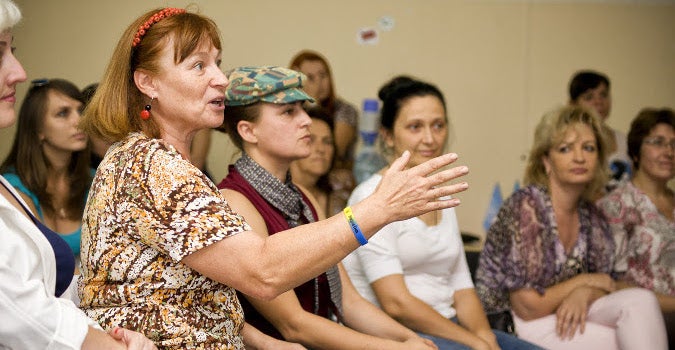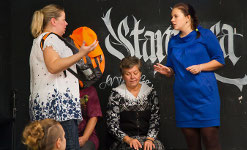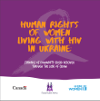Ukraine

The State Statistics Service of Ukraine estimated the total population of the country (excluding Crimea and some areas beyond the control of the Government of Ukraine) on 1 January 2022 at around 41 million[1]. Due to the full-scale Russian invasion in 2022, more than 8 million Ukrainians fled the country, creating a widescale refugee crisis.
Signatory to several international agreements, Ukraine has joined and adopted most of the key international and regional gender equality and women’s empowerment (GEWE) and human rights treaties and has integrated these commitments into several national laws and policies. This commitment is notably enshrined in its adoption or ratification of: The Convention on the Elimination of All Forms of Discrimination against Women (CEDAW) (1979); The Beijing Declaration and Platform for Action (BPfA) (1995); United Nations Security Council resolution 1325 (2000) on Women, Peace and Security (UNSCR 1325); and The Sustainable Development Goals (SDGs) (2015). In addition, Ukraine recently joined G7 Biarritz Partnership for Gender Equality initiative (2020); the Equal Pay International Coalition (EPIC), led by UN Women, the International Labour Organization (ILO) and the Organisation for Economic Co-operation and Development (OECD); and joined the Generation Equality Actions Coalitions.
The Global Gender Gap reports for 2020–2022[2] show that, despite legislative advancement and international commitments, there is a lot of room to improve in terms of advancing gender equality in Ukraine: In 2020 Ukraine was ranked in 59th place on this global report, but by 2022 it was ranked 81st out of 146 countries. The 2021 Gender Inequality Index ranks Ukraine 103rd out of 156 countries on women’s political participation, with a slight improvement in 2022 (to position 100).
Despite the dire circumstances of wartime, women’s rights and gender equality remain a priority for the Ukrainian Government. In 2022, Ukraine ratified the Council of Europe Convention on Preventing and Combating Violence against Women and Domestic Violence (the Istanbul Convention) and with broad participation of women and of women’s organizations updated the National Action Plan on UNSCR 1325 to reflect new wartime challenges, including conflict-related sexual violence and trafficking; and the new State Strategy for ensuring equal rights and opportunities for women and men by 2030, and developed the strategy to eliminate the gender pay gap in Ukraine.
The ongoing full-scale Russian invasion continues to brutally disrupt each sphere of life in Ukraine. According to the second Ukraine Rapid Damage and Needs Assessment (RDNA2) for the period from 24 February 2022 to 24 February 2023 – which was jointly prepared by the World Bank Group, the Government of Ukraine, the European Union, and the United Nations in coordination with humanitarian and development partners, academia, civil society organizations (CSOs), and the private sector – direct damage in Ukraine has reached over USD $135 billion, with housing, transport, energy, and commerce and industry being the most affected sectors.
Disruptions to economic flows and production, as well as additional expenses associated with the war, are collectively measured as losses and amount to some USD $290 billion. Ukraine’s gross domestic product (GDP) shrank by 29.2 per cent in 2022, and poverty increased from 5.5 to 24.1 per cent in 2022 (based on the poverty line of USD $6.85 per person per day). Reconstruction and recovery needs are estimated at about USD $411 billion, as of 24 February 2023.
The impacts of war are uneven, with the greatest effects on women, children and people with disabilities. At the beginning of 2023, the UN had verified the killing of at least 2,296 women and girls since the start of Russia’s full-scale invasion of Ukraine. The actual numbers are likely significantly higher. Women and their children represent 90 per cent of the 7.9 million people who have been forced to move to other countries. Of those displaced inside Ukraine, 68 per cent are women. Many have lost their homes and jobs and lack access to basic social services and protection. Twelve months into the conflict, 7.8 million women and 2 million girls in the country needed assistance.
As reported in RDNA2, there have been dramatic setbacks on many of the SDGs, especially those related to poverty, health, education, energy, industry, peace and justice. Assessed female-headed households were more likely to report “extreme” or “extreme+” needs (46 per cent), compared to male-headed households (38 per cent). Pregnant and breastfeeding women, young single women and women from minority groups (such as Roma and stateless women) are particularly vulnerable to protection risks, gender-based violence and security risks during displacement. Among those with the status of unemployed who were receiving State Employment Service support, the majority were women (68 per cent in January 2023). Only 25 per cent of internally displaced women rely on regular wages as their main source of income.
Massive and protracted displacement and conscription into military service have also caused gendered impacts, led to the separation of families and increased the size of Ukrainian households. Many women have become the sole breadwinners and caregivers in their families, putting them in a vulnerable financial and social position. The war has also led to worsening inequalities and discrimination, increased gender-based violence, including domestic violence, conflict-related sexual violence and human trafficking.[3]
Women-led organizations have become first responders on the front lines of Russia’s war on Ukraine, providing fundamental services to vulnerable groups. They also are well-placed to influence and inform decision-making on responses across the humanitarian-development spectrum. CSOs and volunteer groups led by women quickly mobilized at the onset of the war, pivoting from their core roles to instead support increased access to critical services and humanitarian aid.
UN Women has worked in Ukraine since 1999 to help the country meet its gender equality commitments and unlock progress for both women and men. Since 2015, UN Women has been scaling-up its presence and programme. Despite the volatility and war in Ukraine, UN Women remains committed to delivering results across strategic priorities, exercising its triple mandate and building key partnerships. With the war in Ukraine having dramatically shifted the immediate priorities, it is more essential than ever that the rights of women and girls remain at the centre of the humanitarian response.
UN Women has long been actively supporting local priority areas in Ukraine – from increased political participation to gender mainstreaming in public policy and economic development – to facilitate the work of local women-led CSOs. Aligning with UN priorities, UN Women’s future operations in the country focus on amplifying localization, strengthening local women-led gender-responsive humanitarian response, and ensuring that the experiences of displaced, at-risk, and vulnerable women and girls remain front-and-centre during the recovery process. In 2023, the UN Women Ukraine Country Office is focusing on the following approaches:
- Strengthening partnerships with women CSOs, the national women’s machinery and UN entities to effectively respond to the needs of women and girls across the Humanitarian-Development-Peace (HDP) nexus.
- Providing thought leadership through knowledge and analyses.
- Leveraging UN Women’s coordination mandate and partnerships in Ukraine.
- Establishing and scaling-up its field presence to be closer to affected populations.
--------------------------------------
[1] The State Statistics Service of Ukraine (ukrstat.gov.ua)
[2] World Economic Forum. 2020, 2021, 2022. Global Gender Gap reports. https://www3.weforum.org/docs/WEF_GGGR_2020.pdf; https://www3.weforum.org/docs/WEF_GGGR_2021.pdf; https://www3.weforum.org/docs/WEF_GGGR_2022.pdf
Internally displaced women of Ukraine find voice through interactive theatre
As the armed conflict in Eastern Ukraine enters its fourth year, one organization is working to empowering internally displaced women by engaging them, along with women from the host communities, in the theatre. Read more »
See more news from Ukraine here.
Latest news
Featured Publication
Human rights of women living with HIV in Ukraine: Results of community-based research through the lens of CEDAW
This brochure provides an assessment of the state of human rights of women living with HIV in Ukraine and the analysis of how the implementation of the Convention on the Elimination of Forms of Discrimination against Women (CEDAW) addresses their rights. More
See more publications from Ukraine here.

